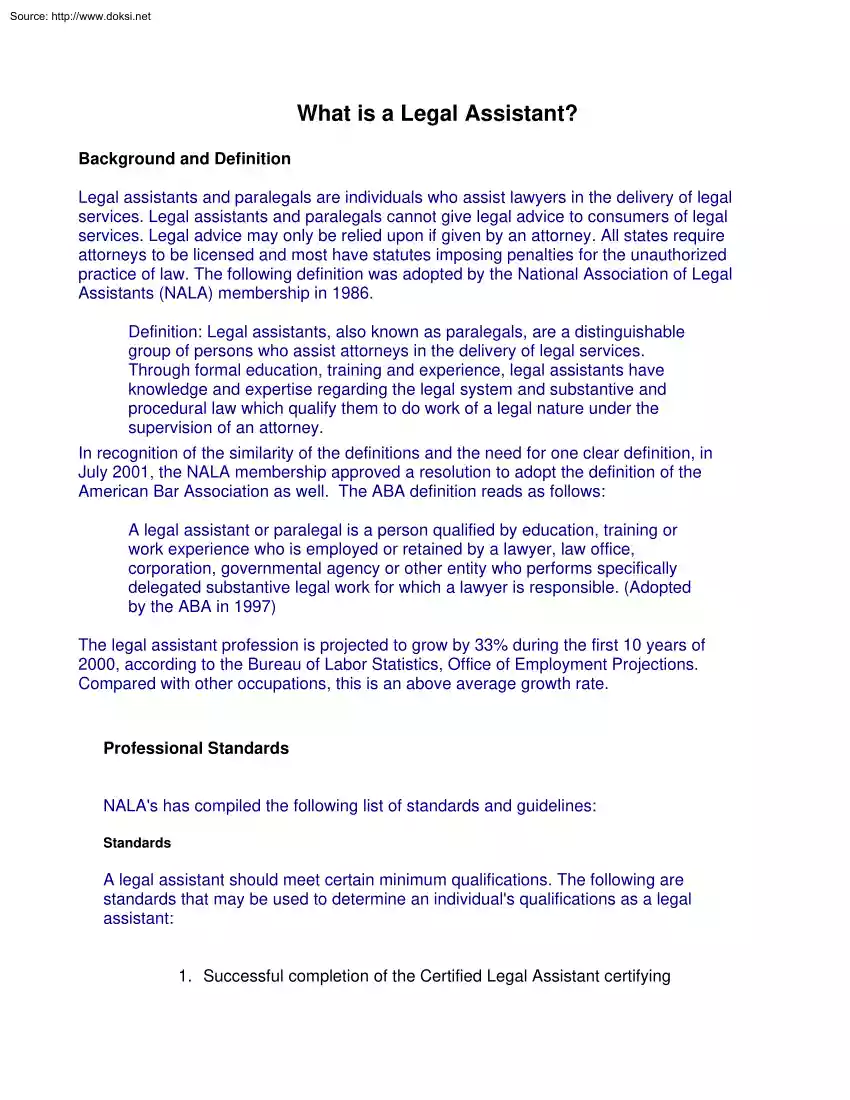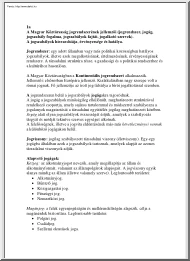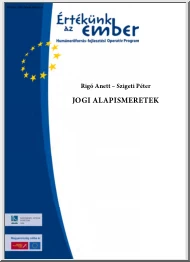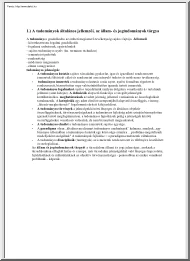Datasheet
Year, pagecount:2008, 6 page(s)
Language:English
Downloads:2
Uploaded:January 28, 2021
Size:490 KB
Institution:
-
Comments:
Attachment:-
Download in PDF:Please log in!
Comments
No comments yet. You can be the first!Most popular documents in this category
Content extract
Source: http://www.doksinet What is a Legal Assistant? Background and Definition Legal assistants and paralegals are individuals who assist lawyers in the delivery of legal services. Legal assistants and paralegals cannot give legal advice to consumers of legal services. Legal advice may only be relied upon if given by an attorney All states require attorneys to be licensed and most have statutes imposing penalties for the unauthorized practice of law. The following definition was adopted by the National Association of Legal Assistants (NALA) membership in 1986. Definition: Legal assistants, also known as paralegals, are a distinguishable group of persons who assist attorneys in the delivery of legal services. Through formal education, training and experience, legal assistants have knowledge and expertise regarding the legal system and substantive and procedural law which qualify them to do work of a legal nature under the supervision of an attorney. In recognition of the similarity
of the definitions and the need for one clear definition, in July 2001, the NALA membership approved a resolution to adopt the definition of the American Bar Association as well. The ABA definition reads as follows: A legal assistant or paralegal is a person qualified by education, training or work experience who is employed or retained by a lawyer, law office, corporation, governmental agency or other entity who performs specifically delegated substantive legal work for which a lawyer is responsible. (Adopted by the ABA in 1997) The legal assistant profession is projected to grow by 33% during the first 10 years of 2000, according to the Bureau of Labor Statistics, Office of Employment Projections. Compared with other occupations, this is an above average growth rate. Professional Standards NALAs has compiled the following list of standards and guidelines: Standards A legal assistant should meet certain minimum qualifications. The following are standards that may be used to
determine an individuals qualifications as a legal assistant: 1. Successful completion of the Certified Legal Assistant certifying Source: http://www.doksinet 2. 3. 4. 5. 6. 7. (CLA) examination of the National Association of Legal Assistants (not required by most employers); Graduation from an ABA approved program of study for legal assistants; Graduation from a course of study for legal assistants which is institutionally accredited but not ABA approved, and which requires not less than the equivalent of 60 semester hours of classroom study; Graduation from a course of study for legal assistants, other than those set forth in (2) and (3) above, plus not less than six months of in-house training as a legal assistant. A baccalaureate degree (BA) in any field, plus not less than six months in-house training as a legal assistant; A minimum of three years of law-related experience under the supervision of an attorney, including at least six months of inhouse training as a legal
assistant; or Two years of in-house training as a legal assistant. For purposes of these Standards, "in-house training as a legal assistant" means attorney education of the employee concerning legal assistant duties and these Guidelines. In addition to review and analysis of assignments the legal assistant should receive a reasonable amount of instruction directly related to the duties and obligations of the legal assistant. Educational Programs Today, there is an estimate of 600 paralegal education programs in the United States. Paralegal education programs are offered in many formats and lengths Various kinds of public and private institutions offer paralegal education, including community colleges, four-year colleges and universities, business colleges and proprietary institutions. These various institutions make it possible for persons with diverse backgrounds to enter the profession. The most common types of programs are: • Associate Degree Programs. These programs
are offered by two-year community colleges, some four-year colleges and universities, and some business schools. Upon successful completion of 60-70 semester units, a student earns an associate degree. The curriculum usually consists of approximately 1/2 paralegal courses and a 1/2 courses in general education and related areas. In selecting a program, prospective student should consider whether they might continue their education to earn a four-year degree at another college and, if so, should investigate the transferability of courses in the programs they are considering. Source: http://www.doksinet • Bachelor Degree Programs. Paralegal education is also offered by four-year colleges and universities which have a paralegal studies major, minor, or concentration within a major. These programs are usually about 120 - 130 semester units, including 30-60 semester units in paralegal and related courses. Upon successful completion of the program, the student is awarded a
baccalaureate degree. • Certificate Programs. Various kinds of educational institutions offer paralegal certificate programs ranging from 18-60 semester units. Longer programs usually include both general education and paralegal courses, similar to associate degree programs. Certificate programs are usually designed for students who already hold an associate or baccalaureate degree. • Masters Degree Programs. A few colleges and universities that offer undergraduate paralegal degree programs are now offering an advanced degree in paralegal studies. Other universities offer advanced degree programs and law-related areas such as legal administration and legal studies. The American Bar Association has a program of approving legal assistant training programs which meet their guidelines. Seeking ABA approval is voluntary on the part of the institution. There are some quality programs that have chosen not to seek approval. However, the ABA guidelines are useful in evaluating a
program For further information about the ABA guidelines, contact the American Bar Association, Standing Committee on Legal Assistants, 750 N. Lake Shore Drive, Chicago, IL 60611. Source: http://www.doksinet LEGAL ASSISTANTS ASSOCIATION OF MICHIGAN, INC. P.O Box 80125 LANSING, MI 48908-0125 Legal Website Links Contract/Agency Companies: Contact Mary Urisko at Paralegals Plus Visit Contract Counsel website, contact Marilyn Hobbs directly at mhobbs@contractcounsel.com or go directly to Contract Counsels job search http://www.contractcounselcom/maincfm?location=1&subsectionid=2 Contact Linda Jevahirian at Legal Search & Management, Inc. Affiliate Organization: National Association of Legal Assistants (NALA) Other Legal Assistant Organizations: National Organizations 1. American Association for Paralegal Education (AAfPE) wwwaafpeorg 2. The American Alliance of Paralegals, Inc, (American Alliance) www.aapiparaorg 3. American Bar Association Standing Committee on Paralegals
www.abaparalegalsorg 4. Legal Assistant Management Association (LAMA) wwwlamanetorg 5. National Association of Legal Assistants, Inc (NALA) wwwnalaorg 6. National Federation of Paralegal Associations, (NFPA) www.paralegalsorg Local Organizations 1. State Bar of Michigan Legal Assistants Section www.michbarorg/legalassist/homehtml 2. Detroit Metropolitan Bar Association Legal Assistants Section www.detroitlawyerorg Source: http://www.doksinet 3. Grand Rapids Bar Association Legal Assistants Section www.firmsfindlawcom/grbala 4. Macomb County Bar Association Legal Assistants Section www.macombbarorg 5. Oakland County Bar Association Legal Assistants Section www.ocbaorg 6. Washtenaw County Bar Association Legal Assistants Section www.washbarorg Other Legal Links: Canadian Process Serving, Inc. For a current list of Paralegal Programs in Michigan please visit: American Association for Paralegal Education (AAfPE) www.aafpeorg Or you may contact any of the following institutions
for more information in regard to their specific program: Academy of Court Reporting in Southfield Davenport University in Grand Rapids/Kalamazoo – ABA approved Delta College in Saginaw Eastern Michigan University in Ypsilanti – ABA approved Ferris State University in Elk Rapids – ABA approved Grand Valley State University in Grand Rapids Henry Ford Community College in Dearborn Kellogg Community College in Battle Creek – ABA approved Lake Superior State University in Sault St. Marie – ABA approved Lansing Community College in Lansing – ABA approved Macomb Community College in Warren – ABA approved Madonna University in Livonia – ABA approved Oakland Community College in Farmington Hills – ABA approved Oakland University in Rochester – ABA approved Source: http://www.doksinet St. Clair County Community College in Port Huron University of Detroit, Mercy in Detroit
of the definitions and the need for one clear definition, in July 2001, the NALA membership approved a resolution to adopt the definition of the American Bar Association as well. The ABA definition reads as follows: A legal assistant or paralegal is a person qualified by education, training or work experience who is employed or retained by a lawyer, law office, corporation, governmental agency or other entity who performs specifically delegated substantive legal work for which a lawyer is responsible. (Adopted by the ABA in 1997) The legal assistant profession is projected to grow by 33% during the first 10 years of 2000, according to the Bureau of Labor Statistics, Office of Employment Projections. Compared with other occupations, this is an above average growth rate. Professional Standards NALAs has compiled the following list of standards and guidelines: Standards A legal assistant should meet certain minimum qualifications. The following are standards that may be used to
determine an individuals qualifications as a legal assistant: 1. Successful completion of the Certified Legal Assistant certifying Source: http://www.doksinet 2. 3. 4. 5. 6. 7. (CLA) examination of the National Association of Legal Assistants (not required by most employers); Graduation from an ABA approved program of study for legal assistants; Graduation from a course of study for legal assistants which is institutionally accredited but not ABA approved, and which requires not less than the equivalent of 60 semester hours of classroom study; Graduation from a course of study for legal assistants, other than those set forth in (2) and (3) above, plus not less than six months of in-house training as a legal assistant. A baccalaureate degree (BA) in any field, plus not less than six months in-house training as a legal assistant; A minimum of three years of law-related experience under the supervision of an attorney, including at least six months of inhouse training as a legal
assistant; or Two years of in-house training as a legal assistant. For purposes of these Standards, "in-house training as a legal assistant" means attorney education of the employee concerning legal assistant duties and these Guidelines. In addition to review and analysis of assignments the legal assistant should receive a reasonable amount of instruction directly related to the duties and obligations of the legal assistant. Educational Programs Today, there is an estimate of 600 paralegal education programs in the United States. Paralegal education programs are offered in many formats and lengths Various kinds of public and private institutions offer paralegal education, including community colleges, four-year colleges and universities, business colleges and proprietary institutions. These various institutions make it possible for persons with diverse backgrounds to enter the profession. The most common types of programs are: • Associate Degree Programs. These programs
are offered by two-year community colleges, some four-year colleges and universities, and some business schools. Upon successful completion of 60-70 semester units, a student earns an associate degree. The curriculum usually consists of approximately 1/2 paralegal courses and a 1/2 courses in general education and related areas. In selecting a program, prospective student should consider whether they might continue their education to earn a four-year degree at another college and, if so, should investigate the transferability of courses in the programs they are considering. Source: http://www.doksinet • Bachelor Degree Programs. Paralegal education is also offered by four-year colleges and universities which have a paralegal studies major, minor, or concentration within a major. These programs are usually about 120 - 130 semester units, including 30-60 semester units in paralegal and related courses. Upon successful completion of the program, the student is awarded a
baccalaureate degree. • Certificate Programs. Various kinds of educational institutions offer paralegal certificate programs ranging from 18-60 semester units. Longer programs usually include both general education and paralegal courses, similar to associate degree programs. Certificate programs are usually designed for students who already hold an associate or baccalaureate degree. • Masters Degree Programs. A few colleges and universities that offer undergraduate paralegal degree programs are now offering an advanced degree in paralegal studies. Other universities offer advanced degree programs and law-related areas such as legal administration and legal studies. The American Bar Association has a program of approving legal assistant training programs which meet their guidelines. Seeking ABA approval is voluntary on the part of the institution. There are some quality programs that have chosen not to seek approval. However, the ABA guidelines are useful in evaluating a
program For further information about the ABA guidelines, contact the American Bar Association, Standing Committee on Legal Assistants, 750 N. Lake Shore Drive, Chicago, IL 60611. Source: http://www.doksinet LEGAL ASSISTANTS ASSOCIATION OF MICHIGAN, INC. P.O Box 80125 LANSING, MI 48908-0125 Legal Website Links Contract/Agency Companies: Contact Mary Urisko at Paralegals Plus Visit Contract Counsel website, contact Marilyn Hobbs directly at mhobbs@contractcounsel.com or go directly to Contract Counsels job search http://www.contractcounselcom/maincfm?location=1&subsectionid=2 Contact Linda Jevahirian at Legal Search & Management, Inc. Affiliate Organization: National Association of Legal Assistants (NALA) Other Legal Assistant Organizations: National Organizations 1. American Association for Paralegal Education (AAfPE) wwwaafpeorg 2. The American Alliance of Paralegals, Inc, (American Alliance) www.aapiparaorg 3. American Bar Association Standing Committee on Paralegals
www.abaparalegalsorg 4. Legal Assistant Management Association (LAMA) wwwlamanetorg 5. National Association of Legal Assistants, Inc (NALA) wwwnalaorg 6. National Federation of Paralegal Associations, (NFPA) www.paralegalsorg Local Organizations 1. State Bar of Michigan Legal Assistants Section www.michbarorg/legalassist/homehtml 2. Detroit Metropolitan Bar Association Legal Assistants Section www.detroitlawyerorg Source: http://www.doksinet 3. Grand Rapids Bar Association Legal Assistants Section www.firmsfindlawcom/grbala 4. Macomb County Bar Association Legal Assistants Section www.macombbarorg 5. Oakland County Bar Association Legal Assistants Section www.ocbaorg 6. Washtenaw County Bar Association Legal Assistants Section www.washbarorg Other Legal Links: Canadian Process Serving, Inc. For a current list of Paralegal Programs in Michigan please visit: American Association for Paralegal Education (AAfPE) www.aafpeorg Or you may contact any of the following institutions
for more information in regard to their specific program: Academy of Court Reporting in Southfield Davenport University in Grand Rapids/Kalamazoo – ABA approved Delta College in Saginaw Eastern Michigan University in Ypsilanti – ABA approved Ferris State University in Elk Rapids – ABA approved Grand Valley State University in Grand Rapids Henry Ford Community College in Dearborn Kellogg Community College in Battle Creek – ABA approved Lake Superior State University in Sault St. Marie – ABA approved Lansing Community College in Lansing – ABA approved Macomb Community College in Warren – ABA approved Madonna University in Livonia – ABA approved Oakland Community College in Farmington Hills – ABA approved Oakland University in Rochester – ABA approved Source: http://www.doksinet St. Clair County Community College in Port Huron University of Detroit, Mercy in Detroit





